 CAIN Web Service
CAIN Web Service
New Year Releases 2005 - Public Records of 1974
[CAIN_Home]
[Key_Events]
Key_Issues]
[Conflict_Background]
BACKGROUND: [Acronyms]
[Glossary]
[NI Society]
[Articles]
[Chronologies]
[People]
[Organisations]
[CAIN_Bibliography]
[Other_Bibliographies]
[Research]
[Photographs]
[Symbols]
[Murals]
[Posters]
[Maps]
[Internet]
PUBLIC RECORDS:
1972
1973
1974
1975
Documents: Public Record Office (PRO) ... Page Compiled: Martin Melaugh
Material is added to this site on a regular basis - information on this page may change
New Year Releases 2005
Public Records of 1974
Northern Ireland
On 1 January 2005 the Public Record Office (PRO) in Kew released a number of government documents under the 'thirty year rule'. Some of these documents were related to events in Northern Ireland during 1974. To coincide with the release of these documents BBC Northern Ireland television broadcast a programme entitled 'Cabinet Confidential' which was shown on the evening of Sunday 2 January 2005. The producers of the programme also compiled a web page based on the programme which included scans of some of the documents in question. (This web page was made available at the PRO web site {external_link}.)
The following page is based on those documents related to Northern Ireland which were scanned and included at the PRO site. The documents are listed in chronological order. Users can either view the documents at the PRO site or at the CAIN site - 'click' on the page numbers (two sets of links are given for each document).
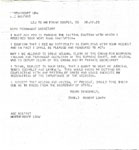 Thursday 20 December 1973
Thursday 20 December 1973
Document reference: CJ 4/487 (Dated 20 December 1973)
Telegram from Robert Lowry to Frank Cooper.
This one page document is a telegram from Robert Lowry, then Lord Chief Justice, to Frank Cooper, then Permanet Secretary at the Northern Ireland Office (NIO). The content deals with the plans for the ceremony to swear in the new power-sharing Executive which was held on 31 December 1973 in the Ministerial Conference Room at Stormont Castle.
"I think, subject to your view, that I ought to wear my judicial robes (scarlet and ermine). This would avoid my setting or conflicting with any pattern of dress and would indicate my recognition of the importance of the occasion."
CJ 4/487 at CAIN web site - Pages: |
1 |
[Use your browser's back button to retrun to this page.]
CJ 4/487 at PRO web site [1 page] {external_link}
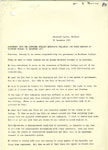 Monday 31 December 1973
Monday 31 December 1973
Document reference: CJ 4/487 (Dated 31 December 1973)
Statement from the Northern Ireland Executive.
This document is the first page of a statement by the Northern Ireland Executive following its first meeting at Stormont Castle, Belfast, on Monday 31 December 1973.
"We have undertaken to serve in the interests of Northern Ireland and all its people. This is the spirit in which we shall always act, both individually and collectively.
We want the New Year to see the beginning, not just of a new system of Government, but of a new spirit. Let 1974 be The Year of Reconciliation. "
CJ 4/487 at CAIN web site - Pages: |
1 |
[Use your browser's back button to retrun to this page.]
CJ 4/487 at PRO web site [1 page] {external_link}
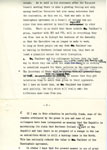 Thursday 10 Jauary 1974
Thursday 10 Jauary 1974
Document reference: PREM 15/2142
Draft of a message from Edward Heath to Liam Cosgrave.
This document is part of a draft of a message from Edward Heath, then British Prime Minister, to Liam Cosgrave, then Taoiseach (Irish Prime Minister).
"But I have no doubt that, as Faulkner has himself said publicly, the help which will really make the difference must come from you.
If I may in this situation be perfectly frank, some of the remarks attributed by the press to you and some of your colleagues have been interpreted as meaning that the Republic is maintaining its claim that Northern Ireland is now part of the Republic and that there is no prospect of a change in the law on extradition which is still a burning issue in the North. This has seriously reduced the value to Faulkner of the Sunningdale agreement
"
PREM 15/2142 at CAIN web site - Pages: |
1 |
[Use your browser's back button to retrun to this page.]
PREM 15/2142 at PRO web site [1 page] {external_link}
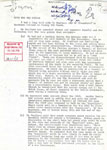 Monday 4 March 1974
Monday 4 March 1974
Document reference: FCO 87/334 (Marked Confidential)
Note for the Record by Frank Cooper, then Permanent Secretary.
This document is the first page of a note of a meeting that took place in Northern Ireland on Monday 4 March 1974. Those attending were Brian Faulkner, then Chief Executive of the Northern Ireland Executive, Kenneth Bloomfield, Northern Ireland Civil Servant, and Frank Cooper, then Permanet Secretary at the Northern Ireland Office (NIO). The meeting discussed the implications of the result of the Westminster General Election (NI) held on Thursday 28 February 1974.
"Mr Faulkner was somewhat shaken and somewhat fearful ... Everyone was shattered by the extent of the feeling against a Council of Ireland ... Faulkner ended by saying that "he was no quitter". He is clearly, however, a worried man and will need a good deal of comfort during the next few weeks.
"
FCO 87/334 at CAIN web site - Pages: |
1 |
[Use your browser's back button to retrun to this page.]
FCO 87/334 at PRO web site [1 page] {external_link}
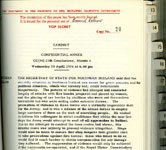 Wednesday 10 April 1974
Wednesday 10 April 1974
Document reference: CAB 128/54 (Marked Top Secret)
Confidential Annex, CC(74) 11th Conclusions, Minute 1
This document is part of one page of the minutes to a meeting held by the British Cabinet on Wednesday 10 April 1974 at 6.00pm. This part of the minutes deals with the security situation in Northern Ireland.
"The Secretary of State for Northern Ireland said that the security situation in Northern Ireland was cause for great concern and the political situation, which was already bad, could deteriorate dangerously. The pattern of violence had changed and consisted largely of attacks with fire bombs prepared and placed by women, and the placing of car bombs by civilians who were not themselves terrorists but who were acting under extreme duress.
"
CAB 128/54 at CAIN web site - Pages: |
1 |
[Use your browser's back button to retrun to this page.]
CAB 128/54 at PRO web site [1 page] {external_link}
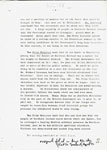 Thursday 18 April 1974
Thursday 18 April 1974
Document reference: PREM 16/145 (Marked Secret)
Note of meeting between Harold Wilson and the Northern Ireland Executive.
This document is part [page 7] of a note of a meeting between Harold Wilson, then British Prime Minister, and the Northern Ireland Executive which was held in Stormont Castle on 18 April 1974.
"The Prime Minister therefore came back to the point at which he began: that it was vitally important to make the Executive and power-sharing a success. In discussions about the consequences of its possible failure the words civil war had been used, he feared with reason. Hence there was an absolute determination on the part of the British Government not to give in, or pull out. He recognised however that if our troops were caught in cross-fire between rival terrorist groups the pressure for withdrawal would be very strong."
PREM 16/145 at CAIN web site - Pages: |
1 |
[Use your browser's back button to retrun to this page.]
PREM 16/145 at PRO web site [1 page] {external_link}
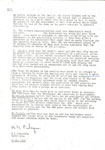 Wednesday 15 May 1974
Wednesday 15 May 1974
Document reference: FCO 87/341 (Dated 16 May 1974)
Note of meeting between Stanley Orme and a UWC delegation.
This document is the last page of a note of a meeting between the Stanley Orme, then Minister of Sate at the Northern Ireland Office (NIO), three Northern Ireland politicians, three members of the Ulster Workers' Council (UWC), and three members of Loyalist paramilitary organisations. The meeting was held at Stormont Castle on the evening of Wednesday 15 May 1974.
The three politicians were Ian Paisley, then Leader of the Democratic Unionist Party (DUP), William Craig, then MP for East Belfast, and John Laird, then Member of the Northern Ireland Assembly. The three UWC members present were Harry Murray, Harry Patterson, and Bob Pagels. Also present were three members of Loyalist paramilitary groups: Andy Tyrie, then Commander of the Ulster Defence Association (UDA), Tommy Lyttle, then member of the UDA, and Ken Gibson, member of the Ulster Volunteer Force (UVF). Tyrie, Lyttle, and Gibson were introduced as 'observers' so that Orme would not be seen as talking with representatives of paramilitaries. It is also believed that all three men took guns with them into this meeting.
"Mr Orme said that the workers would not get what they wanted by attempting to intimidate the Government by a political strike of this nature. If the strike continued the workers would leave the government with no alternative but to carry out essential services by the use of the army.
"
FCO 87/341 at CAIN web site - Pages: |
1 |
[Use your browser's back button to retrun to this page.]
FCO 87/341 at PRO web site [1 page] {external_link}
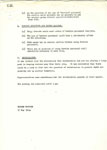 Friday 17 May 1974
Friday 17 May 1974
Document reference: CJ 4/504
Note of a meeting held on 17 May 1974.
This document is the last page of a note of a meeting held on 17 May 1974. [It is not clear from the PRO site or the note which committee was involved in the meeting and who was present.] One of the items discussed at the meeting was the use of intimidation by Loyalist paramilitaries, particularly the Ulster Defence Association (UDA), to prevent people from travelling to work.
"It was evident from the discussions that intimidation had and was playing a large part in keeping workers away from their jobs. It was considered that there could be a need to look into the question of intimidation in greater depth and possibly set up another committee.
"
CJ 4/504 at CAIN web site - Pages: |
1 |
[Use your browser's back button to retrun to this page.]
CJ 4/504 at PRO web site [1 page] {external_link}
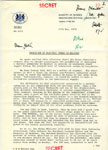 Friday 17 May 1974
Friday 17 May 1974
Document reference: PREM 16/146 (Marked Secret)
Letter from F.E.R. Butler.
This document is the first page of a letter from F.E.R. Butler, then in the Ministry of Defence, discussing the 'Provision of Electric Power to Belfast'. In particular the letter mentions a suggestion by Harold Wilson, then British Prime Minister, that a nuclear submarine might be deployed to Belfast to provide power.
"We spoke earlier this afternoon about the Prime Minister's request that we should investigate the possibility of deploying a nuclear submarine to Belfast to provide an emergency power supply during the present bout of industrial action by Loyalists.
The short answer is that a fleet ... could be ready to leave for Belfast within 48 hours of the order being given.... The difficulty is that electricity generated by a nuclear submarine is not compatible with the national grid....
"
PREM 16/146 at CAIN web site - Pages: |
1 |
[Use your browser's back button to retrun to this page.]
PREM 16/146 at PRO web site [1 page] {external_link}
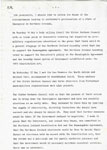 Monday 20 May 1974
Monday 20 May 1974
Document reference: PREM 16/146
Statement by Stanley Orme.
This document is one page [page 1] of a note of a statement made by Stanley Orme, then Minister of Sate at the Northern Ireland Office (NIO), to the House of Commons on 20 May 1974. The statement sought to explain the circumstances surrounding the decision by Merlyn Rees, then Secretary of Sate for Northern Ireland, to announce a State of Emergency (Section 40, Northern Ireland Constitution Act 1973).
"On Tuesday 14 May a body calling itself the Ulster Workers Council with no trade union or democratic standing but supported by paramilitary organisations advertised in the press that there would be a general stoppage if the Northern Ireland Assembly voted that day to support the Sunningdale Agreement.
"
PREM 16/146 at CAIN web site - Pages: |
1 |
[Use your browser's back button to retrun to this page.]
PREM 16/146 at PRO web site [1 page] {external_link}
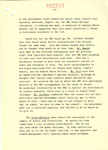 Friday 24 May 1974
Friday 24 May 1974
Document reference: PREM 16/147 (Marked Secret)
Note of meeting held at Chequers.
This document contains two pages [page 2 and page 6] from a note of a meeting held at Chequers, England, between Harold Wilson, then British Prime Minister, and Brian Faulkner, then Chief Executive of the Northern Ireland Executive. Also present were Merlyn Rees, then Secretary of Sate for Northern Ireland, Gerry Fitt, then Deputy Chief Executive; and Oliver Napier, then Legal Minister and Head of the Office of Law Reform.
"Mr Faulkner commented ... "We have come to the crunch": the government must act to maintain supplies, and the failure to do so would be to give in." [Page 2]
"With every hour that passed ... it became increasingly evident that the administration of the country was in fact in the hands of the Ulster Workers Council.
The issue was now not whether the Sunningdale agreement would or would not survive. The outcome which the Protestant extremists sought was without question an independent, neo-fascist Northern Ireland. [Page 6]
"
PREM 16/147 at CAIN web site - Pages: |
2 |
6 |
[Use your browser's back button to retrun to this page.]
PREM 16/147 at PRO web site [1 page] {external_link}
 Saturday 25 May 1974
Saturday 25 May 1974
Document reference: FCO 87/336 (Marked Confidential)
Fax from Harold Wilson to Liam Cosgrave.
This document contains the first page of a fax sent on behalf of Harold Wilson, then British Prime Minister, to Liam Cosgrave, then Taoiseach (Irish Prime Minister). The fax contained the text of a statement that Wilson was due to give on British television later that day. [See also: Full text of the statement.]
"As this holiday weekend begins Northern Ireland faces the gravest crisis in her history. And it is a crisis equally for all of us who live on this side of the water...
The people on this side of the water - British parents - have seen their sons vilified and spat upon and murdered. British taxpayers have seen have seen the taxes they have poured out almost with regard to cost - over £300 million a year this year with the cost of the army operations on top of that - going into Northern Ireland. They see property destroyed by evil violence and asked to pick up the bill for rebuilding it. Yet people who benefit from this now viciously defy Westminster, purporting to act as though they were an elected government, spend their lives sponging on Westminster and British democracy and then systematically assault democratic methods. Who do these people think they are?
"
FCO 87/336 at CAIN web site - Pages: |
1 |
[Use your browser's back button to retrun to this page.]
FCO 87/336 at PRO web site [1 page] {external_link}
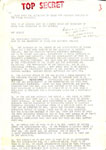 Monday 27 May 1974
Monday 27 May 1974
Document reference: PREM 16/148 (Marked Top Secret)
Memo from Merlyn Rees to Harold Wilson.
This document contains the first page of a memo from Merlyn Rees, then Secretary of Sate for Northern Ireland, to Harold Wilson, then British Prime Minister. In the memo Rees sets out 'The Short-term Possibilities' for Northern Ireland and the Executive.
"While the Northern Ireland Executive remain in being, there can be no real movement. But the situation changes if they go. From our point of view the most desirable situation now is that they should go of their accord, in view of the intervention, they cannot make any plausible complaints that they have not received full support from HMG.
"
PREM 16/148 at CAIN web site - Page: |
1 |
[Use your browser's back button to retrun to this page.]
PREM 16/148 at PRO web site [1 page] {external_link}
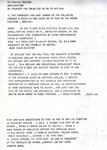 Tuesday 28 May 1974
Tuesday 28 May 1974
Document reference: PREM 16/148
Telegram from Idi Amin to Harold Wilson.
This document is a telegram from General Idi Amin Dada, then President of the Republic of Uganda, to Harold Wilson, then British Prime Minister. In the telegram Amin offers to host a conference in Uganda where representives of the conflict in Northern Ireland could meet.
"I suggest that representatives of the Catholic and Protestant communities in Northern Ireland as well as representatives of your government come to Uganda, far away from the site of the battle and antagonism, for a conference on how to bring peace to their province. I would discuss with and make suggestions to them as how to end the fighting in Northern Ireland.
"
PREM 16/148 at CAIN web site - Pages: |
1 |
[Use your browser's back button to retrun to this page.]
PREM 16/148 at PRO web site [1 page] {external_link}
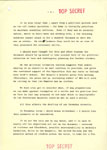 Thursday 30 May 1974
Thursday 30 May 1974
Document reference: PREM 16/148 (Marked Top Secret)
Memo from Harold Wilson.
This document contains one page [page 2] of memo (apparently) written by Harold Wilson, then British Prime Minister, dealing with the aftermath of the Ulster Workers' Council (UWC) strike.
"We have also got to consider what, if any, preparations we can make against resumption of a strike ...
In Doomsday terms - which means withdrawal - I should like this scenario to be considered.
It is not the only one by any means, and it is open to nearly all the objections set out in the document - outbreak of violence and bloodshed, possible unacceptability to moderate Catholics, ditto to the Republic, the United Nations and the possible spread of trouble across the water, to name but a few.
"
PREM 16/148 at CAIN web site - Page: |
1 |
[Use your browser's back button to retrun to this page.]
PREM 16/148 at PRO web site [1 page] {external_link}
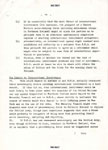 Late 1974
Late 1974
Document reference: CJ 4/492 (Marked Secret)
This document contains one page [page 11] from a memo discussing the possibility of international involvement in Northern Ireland.
"(a) it is conceivable that the mere threat of international involvement (for example the prospect of a UN peace-keeping force including Afro-Asian troops in Northern Ireland) might so alarm the parties as to persuade them to an otherwise unthinkable compromise capable of averting international involvement altogether;
...
(c) even if neither the threat nor the fact of international involvement produced any kind of settlement, H.M.G. would at least be able to share with others the odium of failure and the blame for the ensuing chaos in Ireland.
"
CJ 4/492 at CAIN web site - Page: |
1 |
[Use your browser's back button to retrun to this page.]
CJ 4/492 at PRO web site [1 page] {external_link}
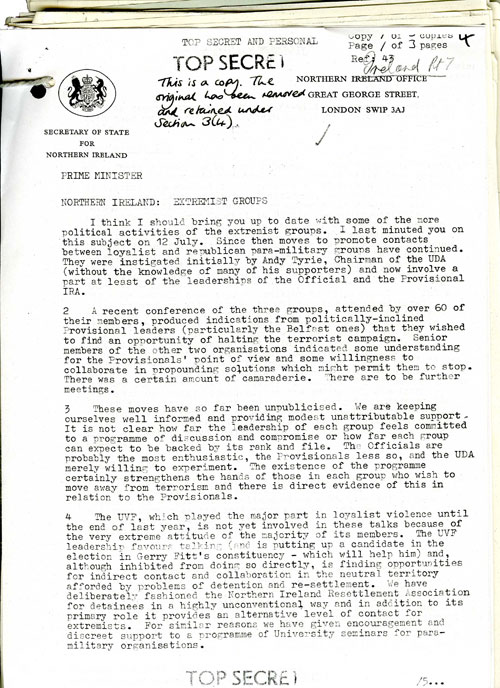 16 September 1974
16 September 1974
Document reference: PREM 16/151 (Marked Top Secret)
Memo from Merlyn Rees to Harold Wilson.
This document contains the first page of a memo from Merlyn Rees, then Secretary of Sate for Northern Ireland, to Harold Wilson, then British Prime Minister. The memo is entitled 'Northern Ireland: Extremist Groups'. The memo begins by mentioning the efforts of the Northern Ireland Office (NIO) to promote contacts between Loyalist and Republican paramilitary groups.
"Since then [12 July 1974] moves to promote contacts between loyalist and republican paramilitary groups have continued. They were instigated initially by Andy Tyrie, Chairman of the UDA (without the knowledge of many of his supporters) and now involve a part at least of the leaderships of the Official and the Provisional IRA.
[At] A recent conference of the three groups, attended by over 60 of their members, ...there was a certain amount of camaraderie...
We are keeping ourselves well informed and providing modest unattributable support."
PREM 16/151 at CAIN web site - Page: |
1 |
[Use your browser's back button to retrun to this page.]
PREM 16/151 at PRO web site [1 page] {external_link}
See also:
Public Records
New Year Releases 2003 - Public Records of 1972
New Year Releases 2004 - Public Records of 1973
New Year Releases 2005 - Public Records of 1974
New Year Releases 2006 - Public Records of 1975
| 
 Thursday 20 December 1973
Thursday 20 December 1973
 Monday 31 December 1973
Monday 31 December 1973
 Thursday 10 Jauary 1974
Thursday 10 Jauary 1974
 Monday 4 March 1974
Monday 4 March 1974
 Wednesday 10 April 1974
Wednesday 10 April 1974
 Thursday 18 April 1974
Thursday 18 April 1974
 Wednesday 15 May 1974
Wednesday 15 May 1974
 Friday 17 May 1974
Friday 17 May 1974
 Friday 17 May 1974
Friday 17 May 1974
 Monday 20 May 1974
Monday 20 May 1974
 Friday 24 May 1974
Friday 24 May 1974
 Saturday 25 May 1974
Saturday 25 May 1974
 Monday 27 May 1974
Monday 27 May 1974
 Tuesday 28 May 1974
Tuesday 28 May 1974
 Thursday 30 May 1974
Thursday 30 May 1974
 Late 1974
Late 1974
 16 September 1974
16 September 1974